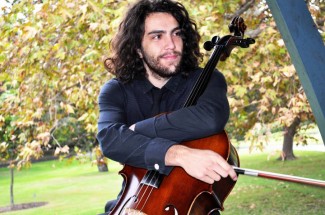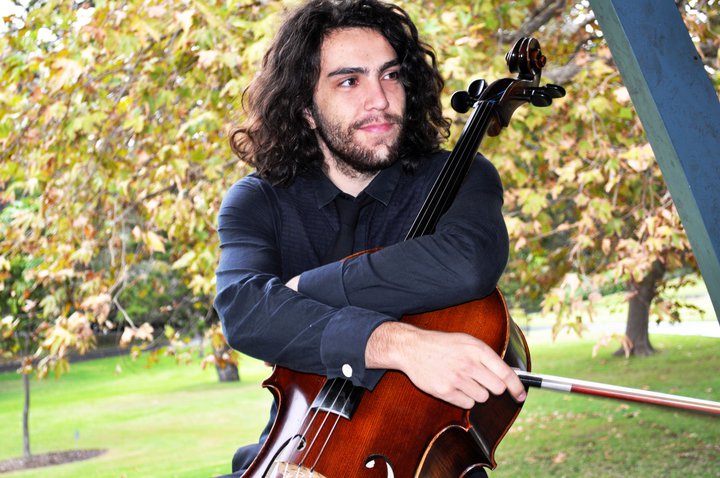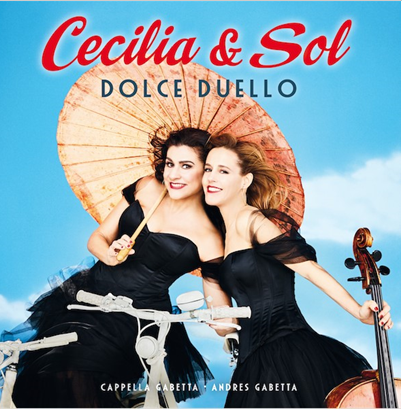Anthony Albrecht ‘s Juilliard Journey

For Sydney cellist Anthony Albrecht, life is about to undergo an irreversible change. In a few weeks he leaves Australia, to undertake a Master’s degree in historical performance at the Juilliard School of Music in New York. “I’m just trying to become an adaptable Renaissance cellist who is capable of performing at the highest level in early music which is what this Master’s is about. It will give me the opportunity to focus on early music – to get to the heart of the composer’s intention and to perform music in the style and with the techniques that the composer would have had at the time.”
Albrecht is frank about his journey. “I’ve always aspired to do something like this, but the reality of actually going through with it and getting over self doubt – even to simply put in an application is a challenge. You have to get over quite a few psychological hurdles in this process.”
Happily, that lengthy application, submitted last December, was accepted. There was contact with the teaching staff who advised on expectations and repertoire, several months of ‘crazy’ practice, and a trip to New York in February this year, where after some lessons, Albrecht auditioned for no less than 12 members of the Juilliard’s Baroque faculty. The audition material included music by CPE Bach, Vivaldi, Geminiani, JS Bach and Gabrieli. “It was a lengthy but manageable amount of music. The first stage was 10 minutes long and I thought I’d messed up – but I was one of 4 to go into the second round. There, I felt like I was flying – everything just came together – it was definitely the best I’ve ever played. Even so, it wasn’t enough to get me in straight away – I was placed on the waiting list and offered a place only after another candidate gave up their position. That’s the level of competition you have to deal with.”
Although the Juilliard dates back to 1905, the Baroque programme was established only in 2009. Albrecht will study with Boston born cellist Phoebe Carrai. After studies at the New England Conservatory of Music, Phoebe Carrai undertook post-graduate studies in Historical Performance Practice with Nikolaus Harnoncourt in Salzburg after which she performed with Musica Antiqua Cologne for ten years. Now she lives in the United States and as well as teaching, performs with The Arcadian Academy, The Philharmonia Baroque Orchestra, Ensemble Arion, Les Musiciens de Louvre and the Handel and Haydn Society.
This passing on of practical and stylistic knowledge is critical. ” It’s not just about trying to dig up the past and re-create it. I think it’s also finding a way of getting to the heart of music and to make it as exciting, entertaining and relevant as possible to modern audiences because they are demanding real integrity and a scholarly, thoughtful basis to classical music. The practice of early music is to do the research and use this to experiment with performance styles to try and reproduce as much as possible what would have been done in the day.”
In 2011, the Proceeding of the National Academy of Sciences reported the results of a ‘double-blinded’ investigation (http://www.pnas.org/content/early/2012/01/02/1114999109) in which 21 experienced violinists were to compare violins by Stradivari and Guarneri del Gesu with good new instruments. The results were confronting. There was little correlation between the age, the cost and the perceived quality of the instruments, and more importantly, most players seemed unable to recognise the age of their preferred instrument. Albrecht’s experience it seems, bears this out. ” I have two cellos. One which I’ve had for about 10 years. It’s a standard modern instrument made in a factory in Germany. It’s got a beautiful sound and has done me proud on many occasions. My Baroque cello is made in the same year, 2002, but it’s a Chinese factory instrument, half the value, and has been modified to Baroque specifications, basically with a new bridge and tail piece without fine tuners. I’ve got a nice Baroque bow. I auditioned at the Juilliard on this cello and it’s delightful to surprise people with the quality of sound that an instrument like this can produce. You don’t necessarily need an incredibly expensive instruments to audition at the Juilliard – you can make the most of what you’ve got.”
Anthony Albrecht is the first Australian to be admitted to this course and joins a very select number of Australians to have studied at the Juilliard, amongst them pianist Kathy Selby and violinist Dene Olding. Other music alumni range from Renee Fleming to Nina Simone, Chick Corea to Wynton Marsalis, Leonard Slatkin to James Levine. The Novocastrian polymath is fluent in German and is working hard to complete his Honours degree in Geography before he leaves. Sydney audiences will have seen him perform in ensemble with Kathyrn Selby and Alice Evans from the ACO, Sydney Camerata, Pacific Opera, The Sydney Consort and Salut! Baroque and in a solo recital as part of the Musica Viva Festival in 2011. He has attended summer schools with the Freiburg Baroque Orchestra and the Académie Européenne de Musique Ancienne, in Vannes, France. He has also spent several extraordinary days of private study with cellist Peter Wispelwey in Holland, and undertaken two Ironwood Developing Artist residencies at Bundanon, the Arthur Boyd Trust property near Nowra, with plans to return for a core ensemble workshop in mid-2012.
He concludes “On my return to Australia I will bring back a set of technical skills, cultural exposure and musical passion fostered at one of the world’s greatest arts institutions. I hope to inspire many others to follow this path …. and make my own contribution to professional music making in my home country. Juilliard will open doors to me, and I hope to use the opportunity to open doors for others as well by forging international relationships and collaborations.”
Anthony Albrecht is seeking support for his studies at the Juilliard School through the crowdfunding website pozible.com. If you would like to find out more or support him please visit” “http://www.pozible.com/index.php/archive/widget_2011_1/7876/15472/626262
Anthony Albrecht spoke to Shamistha de Soysa for SoundsLikeSydney ©



